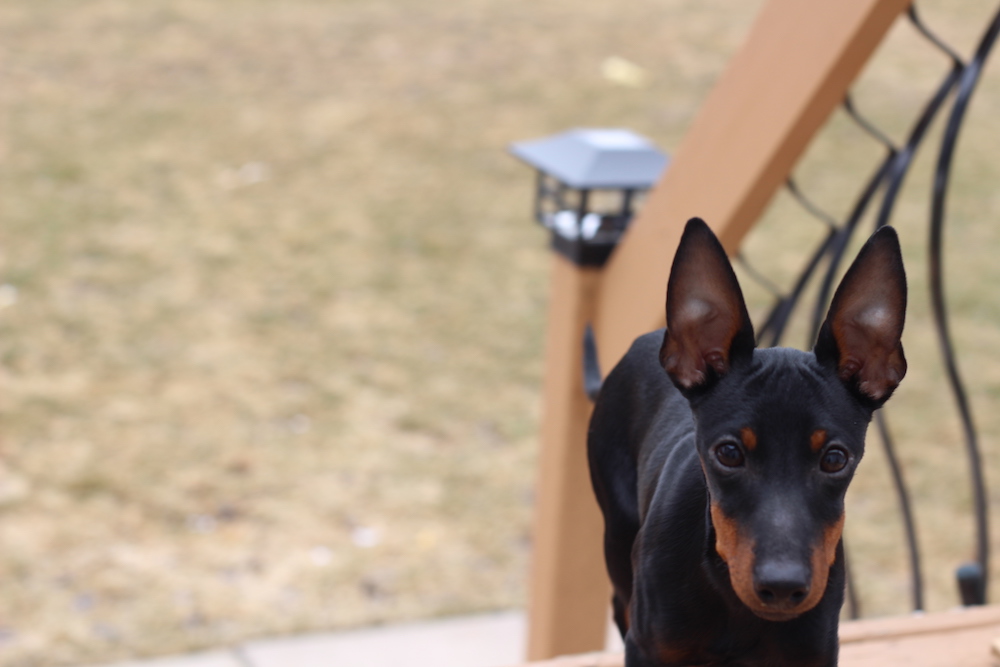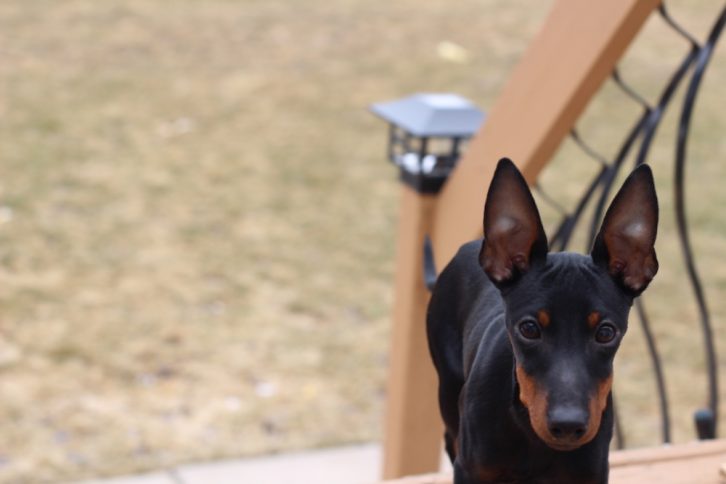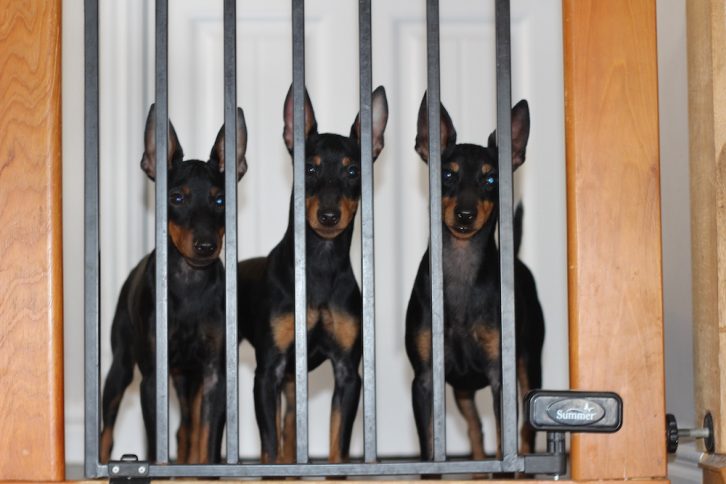Dogs
How to sniff out a good dog breeder
A guide to buying a purebred dog

caption
Dog waits at the back door to come back in the house.
caption
A dog waits at the back door to come back in the house.When Amanda Kelly’s grandparents bought her family a Toy Manchester Terrier (TMT) 33 years ago, they didn’t question that the dogs were kept in a shed in the backyard. There are breeds, like beagles, that have been bred to work in packs and are suited to living in kennels. But Kelly says TMTs get bored in kennels and are better off living among people.
“It was just one of those things — my grandparents didn’t know any better,” says Kelly. “They just went and got a puppy.”
Today, Kelly— a TMT breeder herself— keeps her dogs in her house in Lower Sackville. During her time as a breeder, Kelly has produced or owned 81 dog show champions and was among the founding members of the Canadian Manchester Terrier Club.
Buying a dog is a big decision, and buying from an irresponsible breeder can set a person up for financial and emotional hardship. However, it can be difficult to tell whether a breeder is doing everything they can for the prospective owner and their dog.
“What it comes down to is ‘Are you comfortable that those dogs are happy, and healthy and well taken care of?’” says Kelly. “That has to be your measure.”
Here’s a guide to help you make the best decision when buying a dog from a breeder.
Do your research
Some dogs can live as long as two decades, which means buying a puppy is a big commitment.
Andrew Patton, the marketing and communications manager at the Canadian Kennel Club, says the organization recognizes 175 different breeds, so it’s important to know if the breed you’re getting suits your lifestyle.
Once you’ve selected a breed, you should also research which health problems the breed might be prone to.
Good breeders will do health testing to prevent these issues from being carried in a line. Thyroid issues, Kelly says, affect a lot of dogs so it’s important for breeders to do blood tests on the potential dam and sire (mother and father). That way, they’ll be less likely to pass the issue onto their puppies.
“If the health check conversation comes up and people are reticent to talk about that I would say that’s a red flag,” says Patton.
The cost of buying a puppy ranges depending on breed, number of breeders in an area, medical testing and breeding costs. Kelly says prices usually start in the $1000 range but can be more expensive.

caption
Kelly sits with three of her Toy Manchester Terriers on the couch.Ask questions
After you’ve thoroughly researched your breed, Kelly says the next step is calling breeders. You can find breeders by contacting your national breed club. If a breed doesn’t have a Canadian club, there will likely be Canadian members in the American club.
Kelly says the first phone call with a breeder is the time to ask about their health testing and whether or not the breeder offers a guarantee.
A guarantee is an agreement that there will be some kind of compensation if something goes wrong. The nature of the guarantee depends on the breeder. Some guarantees promise to replace a puppy or refund part of a purchase price if something goes wrong within the first few years of ownership.
“I do a lot of studying in genetics and we do a lot of work on health testing,” says Kelly. “But we’re not sequencing the canine genome in our bathtubs.
“The breeder isn’t guaranteeing that you won’t have a problem; the question is ‘What are they going to do if you do have a problem?.’”
Kelly says calling the breeder, before even going to their house, is a good opportunity to ask anything that might make you uncomfortable. She suggests asking how many dogs the breeder has, how long they’ve been breeding dogs and why they breed dogs.
“I think there needs to be a reason to breed,” says Kelly. “We have a waiting list for puppies and I don’t breed unless I have puppy buyers; the world doesn’t need more unwanted dogs.”
Asking these questions can sometimes feel awkward, but she says it’s important to feel comfortable with answers the breeder gives you.
“This is somebody that you’re entering into a relationship with,” says Kelly. “You want to be able to have a good rapport with them because if you do get a puppy from them, they’re your greatest resource after you get home and have questions or problems.”
The kennel club has a list of questions you can ask dog breeders on their website.

caption
A dog looks up at its owner from the couch.Meet the mother
When you think you’ve found a potential breeder, and you’re satisfied with how they’ve answered your questions, the next step is going to the facility and meeting the mother.
The father may not always be in the picture. Since TMTs are so rare, Kelly has flown dogs in from other countries and even imported frozen semen to impregnate her dogs. But the mother should be available for you to meet and is usually a good indication of what your puppy might be like in adulthood.
Kelly says the mother can sometimes be standoffish because they get “a little out of sorts” when they have puppies. Depending on the puppies’ age, she says the mother may not be appreciative of visitors.
The average dog could have a litter once or twice a year, but litters are hard on the mother. In Kelly’s experience, three litters would be the maximum for a female TMT, which give birth to about four pups per pregnancy. Larger dogs could give birth to up to 10 puppies in a litter though, which would be more strenuous for the dam.
“It’s a question of level of comfort,” says Kelly. “Is it clean? Are the puppies happy? Are they in good weight? Are their toe nails well trimmed?”
Patton says alarm bells should be going off if you are not welcomed to see where the dogs are living and to meet the dam.

caption
Toy Manchester Terriers wait to greet their owner.What should your puppy come with
In Nova Scotia it’s illegal to sell a dog without a Veterinary Certificate of Health. Puppies should also have received their first set of regular shots and have been dewormed as a preventative measure. Kelly’s dogs are dewormed at two, four, six and eight weeks.
The Canadian Kennel Club requires that breeders registered with organization make their dogs permanently identifiable, which means the dogs should be tattooed or microchipped before sale. This will help dogs in case they get lost.
Kelly says her dogs go home with a blanket that smells like her house, some food and a toy to ease the transition to a new home.

caption
This dog waits for treats next to its blankets.Trust your gut
If the dogs are being grossly mistreated you need to call the SPCA and if you visit the breeder’s house and get a bad feeling, it’s a bad idea to buy the puppy.
“People need to use their heads and not their hearts all the time,” says Kelly. “Buying a puppy because it’s adorable or because you feel sorry for it is just going to encourage the breeder to breed more.”

